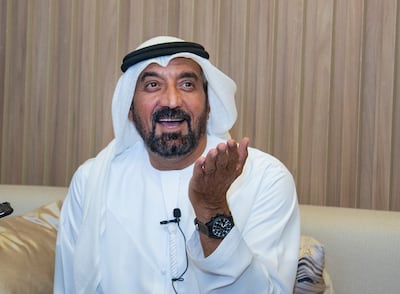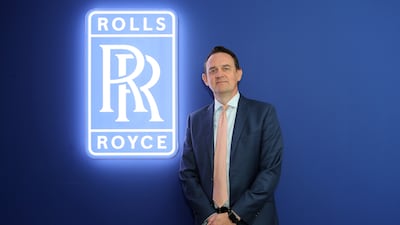Rolls-Royce is working with Emirates to find a resolution for the performance issues on the engine that powers the Airbus A350-1000, as a potential order by the long-haul airline for A350 aircraft hangs in the balance.
The engine maker is addressing Emirates' concerns about the duration of the engine's time on the wing or the period between maintenance visits.
“I want an engine that stays on the wing for the right amount of time and Emirates wants an engine that stays on the wing for the right amount of time, so we're jointly aligned on this and we will continue to work through it,” Ewen McDonald, Rolls-Royce's chief customer officer of civil aerospace told The National at the Dubai Airshow.
“We are always open, honest and give Emirates updates, we believe in transparency, we believe in the strong relationship that comes through trust.”
Rolls-Royce's long-standing relationship with Emirates Airline and its president Tim Clark remains unaffected by the situation.
“Our relationship is unchanged through this, it's very positive and will continue to be very positive. We have lots of aircraft with Emirates and we will continue to work with him on what he wants to do with his fleet and we will support that,” Mr McDonald said.
Rolls-Royce is taking measures to enhance the durability of the Trent XWB-97 engines that power the A350-1000 craft and insists the engines are not defective.
That engine “is the most efficient engine … flying today, so it really is high-tech and something we're very proud of. That engine works great and perfectly in environments which are not harsh, we call them benign environments”, he said.
But the desert environment can prove to be harsh, he added.
“When you come to non-benign environments, sandy and hot conditions, it's really testing for engines because they run it at very high temperatures. Sand with high temperatures is a challenge, it's an industry challenge to all new generation engines as far as harsh conditions,” he said.
“It's not that the engines cannot perform a mission, they just do not stay on wing as long as they should.
“It's a durability issue, it's not a defect issue as has been mentioned.”

Earlier at the Dubai Airshow, Sheikh Ahmed bin Saeed, chairman and chief executive of Emirates Airline and Group, said the carrier would not buy the flagship A350-1000 from Airbus until issues with the Rolls-Royce engine had been addressed.
“When we feel that we have a good deal, we will sign,” he said on Tuesday.
The airline requires specific guarantees from the engine maker.
“I need guarantees on when, at what price and the maintenance cost per hour. That would solve it,” he said.
Emirates already has an existing order for 50 units of the smaller A350-900 model. It also placed an additional order for 15 more of the aircraft on Thursday. The first delivery is expected next summer.
Rolls-Royce is already developing technology to use on existing engines to improve durability, Mr McDonald said.
Wide-body jet market revival
Rolls-Royce is optimistic about the recovery of the overall wide-body aircraft market, which is trailing the narrow-body market in terms of orders following the Covid-19 pandemic.
"This year what we've seen is a strong return to international travel around the world, even China's international [travel market] is coming back strongly," Mr McDonald said.
"So what you're seeing is airlines focus on securing wide-body new generation aircraft because they've done a lot of the narrow-bodies and now they're looking at their international fleet."
Airlines are queuing up to secure positions for new aircraft as delivery slots become more scarce and plane makers' backlogs stretch into the 2030s.
"People are worried about availability of slots, I would say the market is hot, it's very lively, and people who want to secure these slots because there's only so many and if you don't get in then you might miss out," he said.
Airlines are also seeking more fuel-efficient aircraft as one way to meet their sustainability goals.
"One of the quickest ways you can make an impact is replacing older aircraft with more fuel-efficient aircraft," Mr McDonald said.
The combination of these factors means there will be more wide-body order announcements through to the end of the year.
"There is so much activity in the market at the moment. It is to be expected, once people start buying aircraft, other people start sitting up and thinking 'maybe I need to buy some'," the Rolls-Royce executive said.
"Outside the launch of a new aircraft, which always [attracts] lots of orders, I would say this year would be the biggest year ... for the wide-bodies market."
The Dubai Airshow kicked off on Monday with home airlines Emirates and flydubai ordering 125 wide-body jets worth $63 billion.
EgyptAir and Ethiopian Airlines also ordered Airbus A350 wide-bodies during the event.



































